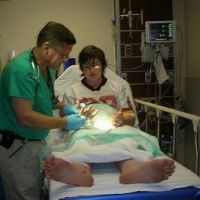Recent studies have found that mindfulness practice may reduce anxiety and depression in clinical populations, and there is growing evidence that mindfulness may also improve well-being and quality of care in health professionals. This study assessed whether mindfulness protects against the impact of work-related stress on mental health and burnout in emergency room (ER) nurses. Results show that mindfulness is a significant predictor of anxiety, depression and burnout, and moderates the impact of work-related stressors on mental health and burnout.
"As expected, mindfulness was associated with lower symptoms of anxiety, depression, and burnout in our ER nurses sample," Maren Westphal, PhD, of the Department of Psychology at Pace University and the Department of Psychiatry at Columbia University, and co-authors write. "In addition, mindfulness moderated the effect of interpersonal stress on anxiety in that low levels of mindfulness predicted increased anxiety in nurses who reported conflict with patients and personnel."
The finding that mindfulness is inversely related to burnout is important given evidence that burnout is associated with lower quality of care and patient perceptions of lowered safety, the authors note in a report published in the Journal of Affective Disorders. Burnout has been defined as a psychological syndrome that comprises emotional exhaustion (ie, depletion of emotional resources, being overextended and emotionally drained), a tendency to depersonalise encounters with clients reflecting a loss of concern and compassion towards others, and a diminished sense of personal achievement at work.
Methodology
Participants were 50 ER nurses employed in the Accident and Emergency Department of an urban teaching hospital in Switzerland. Data were collected via anonymous questionnaires that comprised demographic and work-related questions as well as measures of anxiety and depressive symptoms, burnout, and mindfulness.
Demographic measures were assessed by self-report including gender, age, marital status, number of children, and education. Work-related factors were assessed with single items, including full- or part-time employment, an indicator of contact with patients (as compared to a primarily administrative position not involving direct patient care), whether participants worked night shifts, maximum number of patients during shifts, the number of days that had passed since last day off work, number of shock room experiences during the past week, and two items (yes/no) of whether there was a resuscitation or death of a patient in the last week, respectively.
The authors also assessed with four items whether nurses had experienced any work conflicts with colleagues, medical doctors, other ER staff, or patients, and with one item whether participants had been involved in difficult work-related decisions in the past week.
Results and Discussions
The most frequently reported work-related stressor was interpersonal conflict. Nurses working more consecutive days since last taking time off were at greater risk for depression and those reporting more work-related interpersonal conflicts were at greater risk for burnout.
The general pattern of correlations indicates that greater mindfulness is correlated with better mental health and less burnout. Those higher in mindfulness reported significantly less anxiety (r = -.55, p<.001) and depression (r = -.49, p<.001), as well as less burnout-related depersonalisation (r = -.37, p <.001), and emotional exhaustion (r = -.52, p<.001).
Notably, having direct contact with patients and reporting conflict with patients or with personnel predicted increased anxiety among those with low mindfulness while no significant interaction effects emerged for those high in mindfulness. The finding that mindfulness may confer protective benefits in the context of interpersonal stress is consistent with research suggesting that mindfulness is positively associated with interpersonal relationship quality, social connectedness, and behavioural regulation.
The sample is limited to nurses and results need to be replicated in other groups (eg, medical staff or ambulance workers). The authors assessed clinical symptoms with questionnaires and it would be desirable to repeat this assessment with clinical diagnostic interviews.
Conclusions
The findings have implications for stress management in ER nurses and health professionals working in comparable settings (eg, urgent care). The robust associations between mindfulness and multiple indices of psychological well-being suggest that ER staff exposed to high levels of occupational stress may benefit from mindfulness practice to increase resistance to mental health problems and burnout.
In addition to increasing well-being, mindfulness training could be used to promote resistance to developing stress-related conditions such as burnout and post-traumatic stress disorder in at-risk individuals in the context of prevention programmes.
Image Credit: Google Images
"As expected, mindfulness was associated with lower symptoms of anxiety, depression, and burnout in our ER nurses sample," Maren Westphal, PhD, of the Department of Psychology at Pace University and the Department of Psychiatry at Columbia University, and co-authors write. "In addition, mindfulness moderated the effect of interpersonal stress on anxiety in that low levels of mindfulness predicted increased anxiety in nurses who reported conflict with patients and personnel."
The finding that mindfulness is inversely related to burnout is important given evidence that burnout is associated with lower quality of care and patient perceptions of lowered safety, the authors note in a report published in the Journal of Affective Disorders. Burnout has been defined as a psychological syndrome that comprises emotional exhaustion (ie, depletion of emotional resources, being overextended and emotionally drained), a tendency to depersonalise encounters with clients reflecting a loss of concern and compassion towards others, and a diminished sense of personal achievement at work.
Methodology
Participants were 50 ER nurses employed in the Accident and Emergency Department of an urban teaching hospital in Switzerland. Data were collected via anonymous questionnaires that comprised demographic and work-related questions as well as measures of anxiety and depressive symptoms, burnout, and mindfulness.
Demographic measures were assessed by self-report including gender, age, marital status, number of children, and education. Work-related factors were assessed with single items, including full- or part-time employment, an indicator of contact with patients (as compared to a primarily administrative position not involving direct patient care), whether participants worked night shifts, maximum number of patients during shifts, the number of days that had passed since last day off work, number of shock room experiences during the past week, and two items (yes/no) of whether there was a resuscitation or death of a patient in the last week, respectively.
The authors also assessed with four items whether nurses had experienced any work conflicts with colleagues, medical doctors, other ER staff, or patients, and with one item whether participants had been involved in difficult work-related decisions in the past week.
Results and Discussions
The most frequently reported work-related stressor was interpersonal conflict. Nurses working more consecutive days since last taking time off were at greater risk for depression and those reporting more work-related interpersonal conflicts were at greater risk for burnout.
The general pattern of correlations indicates that greater mindfulness is correlated with better mental health and less burnout. Those higher in mindfulness reported significantly less anxiety (r = -.55, p<.001) and depression (r = -.49, p<.001), as well as less burnout-related depersonalisation (r = -.37, p <.001), and emotional exhaustion (r = -.52, p<.001).
Notably, having direct contact with patients and reporting conflict with patients or with personnel predicted increased anxiety among those with low mindfulness while no significant interaction effects emerged for those high in mindfulness. The finding that mindfulness may confer protective benefits in the context of interpersonal stress is consistent with research suggesting that mindfulness is positively associated with interpersonal relationship quality, social connectedness, and behavioural regulation.
The sample is limited to nurses and results need to be replicated in other groups (eg, medical staff or ambulance workers). The authors assessed clinical symptoms with questionnaires and it would be desirable to repeat this assessment with clinical diagnostic interviews.
Conclusions
The findings have implications for stress management in ER nurses and health professionals working in comparable settings (eg, urgent care). The robust associations between mindfulness and multiple indices of psychological well-being suggest that ER staff exposed to high levels of occupational stress may benefit from mindfulness practice to increase resistance to mental health problems and burnout.
In addition to increasing well-being, mindfulness training could be used to promote resistance to developing stress-related conditions such as burnout and post-traumatic stress disorder in at-risk individuals in the context of prevention programmes.
Image Credit: Google Images
References:
Westphal M, Bingisser MB, Kleim B et al. (2015) Protective benefits of mindfulness in emergency room personnel. Journal of Affective Disorders,
April 2015. DOI: http://dx.doi.org/10.1016/j.jad.2014.12.038
Latest Articles
Stress, ER, Depression, burnout, emergency room, mindfulness
Recent studies have found that mindfulness practice may reduce anxiety and depression in clinical populations, and there is growing evidence that mindfulne...



























